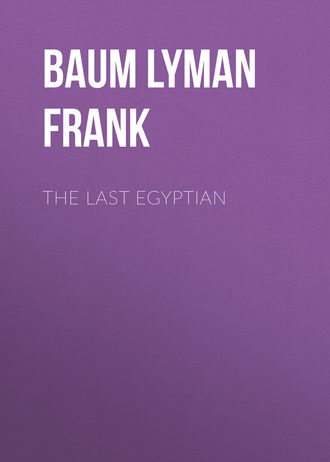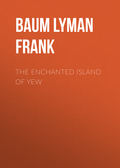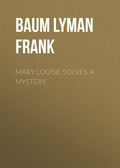
Лаймен Фрэнк Баум
The Last Egyptian
CHAPTER XIX
THE ABDUCTION
Mrs. Everingham passed the afternoon in Aneth’s company. The girl was visibly nervous and excited, but made pitiful attempts to conceal her weakness. In no way did she allude to Kāra or to the fact that the hour had arrived when she was to consummate the sacrifice of her own happiness to maintain her grandfather’s integrity and the honor of her family’s name.
Her friend ventured one or two remarks about the folly of her promise and the absurdity of keeping it; but these so distressed Aneth, and had so little visible influence upon her decision, that Mrs. Everingham abandoned the topic and turned the conversation into more cheerful channels. When she mentioned Gerald Winston she noticed that Aneth’s cheeks flamed scarlet and then turned deathly white; so here was another subject to be avoided, if she did not wish to make the girl’s position unbearable. Indeed, those last days of association with Gerald had taught Aneth the full extent of her martyrdom, and now she began to realize that she was losing all that might have rendered her life’s happiness complete, had it not been for the advent of Kāra and his terrible threat to destroy the family honor and send her loving grandfather to prison.
Early in the evening Mrs. Everingham kissed her friend and returned to her own room across the corridor, there to complete her simple preparations for the proposed voyage.
Meantime Winston had been busy with Lord Roane. The young man was fortunately a prime favorite with Aneth’s grandsire, and he listened attentively to Gerald’s explanation of a plot to rescue his darling grandchild from the slough of despondency into which she had fallen.
“Mrs. Everingham is confident a Nile voyage would do much to cheer her up and keep her from dwelling upon her troubles,” he suggested. “What do you think of the idea, sir?”
“Capital,” said Roane – “if Aneth can be induced to consent. I asked her to run over to Helwan the other day, for a few weeks’ change of scene; but she declared she would not listen to such a proposal.”
“That is our difficulty,” acknowledged Winston, speaking in a confidential tone. “She has told Mrs. Everingham she would not leave Cairo, but we think her decision is based upon the fear that you would be unable to accompany her; so we have decided to engage in a little conspiracy, for the morbid condition into which she has fallen has made us all anxious. Is there any reason, my lord, why you should not leave Cairo for a month or so?”
“None whatever, if my going will benefit Aneth in any way.”
“Very good! Now, here is our plan. I have fitted my private dahabeah for a cruise. Mrs. Everingham will go along to chaperone your granddaughter, and you will join us to complete her happiness and keep her contented. Only one thing stands in our way – the young lady’s refusal to embark. That barrier will be surmounted by Mrs. Everingham, who is a woman of experience and who loves Aneth as well as if she were her own daughter. So this evening you and I will get aboard quietly, without declaring our intentions to anyone, and rely upon Mrs. Everingham’s promise to join us with Aneth at nine o’clock. Do not ask me, sir, how she will succeed in overcoming your granddaughter’s scruples against leaving Cairo. We will trust to woman’s wit. When the party is embarked, we go up the Nile, to find roses for your grandchild’s pale cheeks and have a jolly good time as well.”
Roane accepted the program with enthusiasm. He himself was in a dreadfully nervous state, expecting hourly to be accused of a crime the proof of which would separate him forever from Aneth. To get away from Cairo just now, without Kāra’s knowing where he had gone, would be to gain a few weeks’ respite. Eagerly he availed himself of the opportunity.
Winston knew there was no danger of the old man’s betraying their plans, but he could not divine what Kāra’s next move might be, and resolved to take no chances; so he clung fast to Roane until he had put him and his light luggage aboard the dahabeah, whereupon he sent a messenger to apprise Mrs. Everingham of his success.
So far, all had gone well; but Mrs. Everingham’s anxiety grew as the hour of nine approached. Lord Roane had sent word to Aneth that he would be out for dinner and might not return to the hotel until late that night; so the girl, glad of this fortunate chance, had her dinner served in her own room, and the Arab servant, being intercepted by Mrs. Everingham, declared that she ate little and wept continually, as if overcome by some hopeless sorrow.
All depended now upon the faithfulness of Tadros the dragoman, and Mrs. Everingham, finding nothing more for her woman’s ingenuity to devise, entered a carriage at half past-eight o’clock and was driven quietly to the embankment. Within sight of the three red lights Winston had displayed, she halted her vehicle to await the arrival of the dragoman.
Tadros, meantime, being fully instructed by Kāra as to the conduct of his mission, drove in the Egyptian’s private carriage to the hotel. The coachman had been instructed to obey the dragoman’s orders implicitly, so he suspected nothing when Tadros, having alighted at the Savoy, commanded him to drive to the citadel and remain in the shadow of the mosque until midnight.
The dragoman then hired another carriage that was driven by a sleepy and stupid-looking Arab, after which he immediately entered the hotel and went directly to Aneth’s room.
She opened the door in person, having dismissed all her attendants.
“It is nine o’clock, miss,” announced Tadros, as he entered.
The girl clasped her hands with a gesture and look of terror.
“Where is – is – Prince Kāra?” she asked, vaguely.
“At his villa, awaiting, with the bridal party, your arrival. You must understand that the wedding is to be very quietly conducted, yet strictly in accordance with the requirements of the Christian faith. My master desires me to say that every consideration and courtesy shall be shown you, his highest ambition in the future being to promote your happiness.”
She shuddered.
“Is that all he said?”
“Except that his promises to you shall be faithfully kept, and Lord Roane’s comfort and safety carefully provided for.”
“Let us go,” she said, hastily. “I am ready.”
“Any luggage, miss?” he asked.
She pointed to a small traveling-case that stood beside her, and Tadros stooped and picked it up.
With a frightened glance around her, she placed a note directed to Lord Roane upon the table and then hurriedly left the room, leaving the door unlocked.
The dragoman escorted her to the side entrance, reserved for ladies, and they were fortunate in finding it almost deserted at that moment. Aneth entered the carriage quickly, as if fearful of being interrupted in her escape, and Tadros closed the door and took his seat beside the driver.
“To the opera house,” he said, for the benefit of the few loungers who stood upon the pavement.
After driving a couple of blocks, he made the Arab driver stop in front of a tobacco shop, and sent him in to purchase some cigarettes. The moment the fellow disappeared, Tadros started the horse and applied the whip, and the carriage had whirled swiftly around the comer before the wondering Arab returned to the street, to find his equipage and his passengers missing.
Aneth, as soon as she had leaned back against the cushions, had fallen into a sort of stupor. Her weary brain refused to think or to speculate upon the doubtful fate to which she was rushing. She felt the carriage bumping over the crossings and saw vaguely the lights flash by; but she noted neither the direction in which they were proceeding nor the length of their journey. Across the Nile bridge the horses abated their speed; but then through the darker lanes of the west embankment they dashed along at a wild pace, that might have frightened the girl, had she been capable of realizing the actual conditions.
Suddenly, with a jolt that almost threw her into the opposite seat, the carriage halted. She looked out of the window and saw three dim red lights burning, and beyond these the glint of a stray moonbeam upon the river.
When Tadros came to assist her in alighting, she saw Mrs. Everingham standing behind him.
“Where am I?” asked the girl, wildly.
“Hush, dear,” said her friend, taking her in her arms to kiss her tenderly. “Am I not welcome at your wedding?”
“But why are we here?” asked Aneth, pleadingly. “Why are we at the river, and where is Prince Kāra?”
“Come and let me surprise you,” answered Mrs. Everingham, soothingly, leading the young girl, who was still half dazed and thoroughly mystified, aboard the dahabeah and into the brightly lighted little cabin. There sat Lord Roane and Gerald Winston.
Aneth stared, and then, looking wildly around, she gave a plaintive cry and threw herself into her grandfather’s arms.
“I don’t understand!” she wailed, sobbing hysterically. “What does it all mean? Why are you here, and where is Prince Kāra?”
Roane was puzzled by her speech, as well as distressed by her agitation.
“Prince Kāra!” he repeated. “Confound it, Aneth, you don’t want that rascally nigger, do you?”
“No, no!” she replied; “but he wants me, and I have promised; I must go to him. Why am I here? What have you done?”
By this time the dragoman had tied his horses to a palm and come aboard, just as Hassan drew in the gangplank and Abdallah started the wheezy engine. Tadros stood in the cabin doorway and listened intently to Aneth’s protests.
“See here, miss,” he exclaimed, with assumed sternness, “you are in my charge, for I am Prince Kāra’s dragoman, and you have promised to obey me. Is it not so?”
She turned to look at him.
“Are you obeying Prince Kāra’s orders?” she demanded.
“To be sure! He wished to surprise you. He says he merely intended to test your honesty, being interested in knowing whether an English girl would keep her promises. But he does not desire to make you unhappy. He is a prince, and generous; therefore, he releases you from your compact, and you are free from this time forth to do exactly as you please.”
She was white and trembling now.
“But my grandfather – ” she began, eagerly.
Tadros cut her short.
“He also is safe, in proof of which you see him at your side. You need have no fears in the future that – ”
He stopped abruptly, for the overwrought nerves of the girl could not withstand this sudden revulsion of fate. Gerald caught her swaying form and carried her to her berth, where Mrs. Everingham tended her lovingly and applied restoratives to relieve her faintness.
As for Lord Roane, he swore loudly and glared upon the dragoman.
“What cursed nonsense is this?” he cried.
Tadros smiled, and Gerald came up and seized the dragoman by both hands, pressing them warmly.
“Thank you, my man!” said he. “You are a loyal ally, and I shall not forget how you have lied to save us from an embarrassing position.” Then he turned to Lord Roane. “If there is anything your lordship does not understand,” he said, “I will gladly endeavor to explain it. Prince Kāra has been playing a deep game, with you and Aneth as pawns; but I think we have him checkmated at last.”
The old nobleman did not reply at once. Any questioning on his part would necessarily be a very delicate matter. He turned his eyes thoughtfully toward the shore, where the lights of Cairo were slowly disappearing from their view.
CHAPTER XX
THE SHEIK AGREES
Kāra congratulated himself. For one whose early life had been passed in a hovel, he had been very successful in directing the destinies of the great. All his grandmother’s vengeful plans, supplemented by his own clever arrangement of details, had matured in a remarkably satisfactory manner, and this evening he was destined to complete the ruin of Lord Roane’s family. In addition to compromising Aneth beyond all hope by a false marriage, he would to-morrow have my lord cast into prison on a charge of embezzlement. The proof which he had pretended to place in the girl’s keeping, and which she had without doubt promptly destroyed, was merely a forgery of the receipt to McFarland. The original was still safe in his custody.
This ruse had been a clever one. His judgment of the girl’s nature was marvelously accurate. Having destroyed the paper to insure her grandfather’s safety, Aneth was effectually prevented from breaking her contract with Kāra. There was no way for her to recede. He had paid the price, and she was left with no excuse for not fulfilling her part of the agreement.
When Kāra entered his courtyard he found it ablaze with lights. The women’s apartments, now completely refitted, were truly magnificent. A dozen servants, arrayed in splendid costumes, stood motionless at their posts, awaiting the arrival of their new mistress. Mykel, a rascally Copt whom Kāra had recently attached to his household, was clad in priestly robes, and paced up and down the court with an assumed dignity that elicited sly smiles from his fellow-servants.
Only the prince’s own people were present, for Kāra wished to be in a position to deny even the farce of a ceremony, should Aneth attempt in the future to use it as an excuse for her downfall. But it pleased him to lull her suspicions in this way in the beginning, and so render her an easy victim. It also gave an added flavor to his revenge.
Tadros had been carefully instructed, and would have no difficulty in fulfilling his mission. He ought to reach the villa on his return by half-past nine, allowing for natural delays. Kāra trusted Tadros because the dragoman was so completely in his power; but, with his usual caution, he had sent a spy to watch his messenger and report any irregularity in his conduct. Tadros did not know of this spy; otherwise, he might have felt less confidence in himself.
Half-past nine arrived, but no sound of carriage wheels broke the stillness. The servants stood motionless in their places, and Kāra paced the courtyard in deep reflection while engaged in drawing on his white kid gloves. The false priest stood under the bower of roses where the ceremony was to take place, trying to find the service in the Coptic Bible he had borrowed.
Nine-forty-five; ten o’clock. The dark-eyed servants noticed that their master grew uneasy and cast anxious glances toward the entrance.
It was twenty minutes later, when the nerves of the most unconcerned were beginning to get on edge, that the patter of horses’ feet and the rapid whir of wheels broke the silence. A carriage dashed up to the villa and halted.
Kāra hurried forward expectantly, but paused abruptly when he met the spy who had been sent to watch Tadros.
“Where is the dragoman?” he demanded, in a sharp voice.
“The dragoman, your highness, is a traitor,” said the man.
Kāra’s nervousness suddenly subsided. He became composed in demeanor and his voice grew soft.
“Explain, if you please,” said he.
The man bowed.
“Arriving at the hotel, Tadros sent away your excellency’s carriage – ”
“Where is it now?”
“I do not know. Then he engaged another equipage – that of the Arab named Effta Marada, bearing the number of ninety-three. Tadros brought the young lady down and placed her in Effta’s carriage, ordering him to drive to the opera house. I sprang up behind and accompanied them. Tadros soon got rid of Effta by sending him on an errand and then drove quickly away. He crossed the Nile to the west embankment and drove down the river to a point opposite the island of Roda, where your dragoman placed the lady on board a dahabeah.”
“Yes; go on.”
“When the boat steamed away up the river, I took the deserted carriage and drove here as rapidly as possible. That is all, your excellency.”
“Whose dahabeah was it?”
“That belonging to Winston Bey. I saw him on board.”
“Did you see anyone else?”
“The lady who has been a friend to Miss Consinor.”
“That is Mrs. Everingham.”
“And an old Englishman, Lord Roane.”
“Ah! Quite a family party. And our dear Tadros went with them?”
“He did, your excellency.”
“Up the river, you say?”
“Yes, your excellency.”
“Thank you. You may retire.”
Kāra turned to Ebbek.
“Put out the lights and send the servants to their quarters,” he said, calmly.
In his room the prince tore off the white gloves and changed from evening dress to a gray traveling suit. Then he returned to the now deserted courtyard and sat down in the moonlight beside the fountain to smoke a cigar.
The blow had been sharp and sudden. While Kāra fully realized the natural capability of Tadros for deception and double dealing, he also knew that the blustering dragoman was an arrant coward, and so was bewildered at the courage manifested in his treachery.
But it was characteristic of Kāra that he neither bemoaned his adverse fortune nor became despondent. He entertained a passing regret that he had delayed killing the dragoman, but did not permit himself to dwell long upon his servant’s defection. The thing to be first sought was a remedy for the apparent failure of his carefully laid plans. By and by he would attend to the dragoman’s reward. Just now it was imperative to prevent his intended victims from succeeding in their attempt to escape.
There was no demand for immediate action. The dahabeah was, as he knew, a slow steamer, and would be forced to breast the Nile current sluggishly. His enemies doubtless depended for their safety from pursuit upon Kāra’s supposed ignorance of their whereabouts. He admitted that someone had plotted shrewdly against him. On the Nile a party in a small boat is almost as isolated as if at sea. The express steamers and tourist steamers pass now and then, but they travel rapidly, appearing and disappearing within the brief space of half an hour. Aside from these, only the native barges, picturesque and ghostlike as they drift by, break the ripples of the broad river. The banks are sprinkled with many villages, and at this season shaduf workers are plentiful; but the native has tired of staring at the Nile flotilla, unless awaiting with eagerness the landing of the big tourist steamer, from whose passengers a scant livelihood is gained, and this occurs only at certain points of interest.
So Kāra had time to be deliberate. It even occurred to him that this seeming calamity might turn out to be exceptionally favorable to the success of his schemes. In Cairo one must act with circumspection, because the police of the city are alert and almost incorruptible. The Nile dwellers fear the law rather than respect it; but they are too far from the capital to be very much afraid. Where tourists disembark, a mounted officer is stationed to lash the impudent villagers into a state of dull apathy, such as the caged tiger feels for its trainer; but they lapse into savagery when his back is turned, and in the more unfrequented villages the sheik is absolute king.
Kāra considered carefully these conditions, and soon formed new plans to complete his vengeance. Then, the cigar being finished, he went to bed and slept until daybreak.
“I shall be absent for several days,” he said to Ebbek, as he ate an early breakfast. “See that everything is in perfect order when I return. If tradesmen come to demand money, promise them payment immediately on my arrival in Cairo.”
“Yes, my master.”
He caught the morning train for Luxor and arrived by noon at a station opposite the native village of Beni-Hassan, whence he crossed the river in a small boat.
The children of Hassan have for centuries been known as “the bandits of the Nile,” and their three connected villages, lying close to the river bank, have replaced those that were totally destroyed by the Government during the reign of Mohammed ‘Ali in the hope of scattering the tribes and breaking up their thieving propensities; but the Beni-Hassans rebuilt their mud dwellings and calmly remained in possession. To-day they are cautiously avoided by isolated tourists, who are fully warned of their evil reputation.
As he landed, Kāra found the villages seemingly deserted. Underneath the tall palms at the right a few swathed figures lay motionless, while small black goats and stray chickens wandered listlessly about; but the visitor paid little attention to these signs. He knew the old men and women were swarming in the huts while the younger men were away at the distant tombs in the hills or engaged in earning a stipend at the neighboring shadufs.
Turning to the left, he followed a path leading up a slight incline to the low bluff covered with a second grove of stately palms, beneath the shade of which the better dwellings of Beni-Hassan have been built. He had never been in the village before, but had heard it described innumerable times since his boyhood. Even when he paused before an extensive building having cane and mud walls and a roof of palm leaves, he was fairly certain he had correctly guessed the location of the place he sought.
“Does Sheik Antar live here?” he asked a child that came out to stare at him.
The little one nodded and ran within. Kāra sat down cross-legged upon the path of baked mud, removed both his shoes and placed them beside him, and then patiently awaited his reception.
After some five minutes a gigantic Arab bent his head to emerge from the low doorway, and, after a calm but shrewd glance at his visitor, came forward and stood before Kāra.
“Allahu akbar!” he said, spreading wide his arms in greeting. “The stranger is welcome to all that I possess.”
“May Allah bless and guard the habitation of the mighty sheik!” responded Kāra, in purest Arabic.
Then the sheik sat cross-legged upon the ground, facing his guest, and also removed his red morocco slippers. His beard was gray and his eyes black and piercing. His frame was lean and the flesh hard as iron, denoting great strength. He wore the green turban that proved he had made the Mecca pilgrimage.
“It pleases me that I behold the mighty Sheik Antar, beloved of Allah, and the curse of all enemies of the prophet,” began Kāra after a brief silence, during which the men eyed each other earnestly.
“My brother speaks well,” was the grave reply; “yet so lost am I in wonder at the glory and honor conferred upon my humble home by his presence, that the exalted name of my guest escapes my fickle memory.”
Kāra bowed to the ground.
“I am of Gebel Abu Fedah, the grandson of the Princess Hatatcha, and descended from the line of Ahtka-Rā and the royal kings of ancient Egypt. My name is Kāra.”
With dignified gesture the sheik extended his hand and clasped that of the stranger.
“The fame of the last great Egyptian has already reached my ears,” said he. “Raschid, the Syrian dragoman, whose boat, the Rameses, was here but three days since, told me of your life in Cairo, of your magnificence and vast riches, of your generosity and wisdom. Fedah I know, for the sheik of Al-Kusiyeh is my comrade. The glory of Kāra the Egyptian is reflected upon every dweller along the Nile bank.”
After another pause to permit of due and deliberate appreciation of this compliment, Kāra drew a heavy sigh and responded:
“Yet all is not at peace with me, most noble Antar. My enemies oppress me and cause me much sorrow; wherefore I am driven to appeal to my brother for aid.”
The eyes of the sheik sparkled.
“Already,” said he, “confusion has fallen upon Kāra’s foes; for they surely cannot escape the blight of Antar’s hatred!”
“Then see how gratitude flows from my heart like a very cataract,” answered the other, with downcast eyes. “It is little that Kāra can do to repay such brotherly love; but the great sheik must distribute for me ten thousand piastres to his worthy poor, even on that day when my enemies are confounded.”
Antar’s brow was thoughtful. A great payment meant a great service.
“My brother will tell me a story,” said he, “and I will listen.”
Thereupon, in the flowery language of Arabia, which English words but feebly translate, the Egyptian told of a boat steaming slowly up the Nile and bearing his enemies toward the villages of Beni-Hassan. He described the women and the men, and noticed that the sheik grunted with discouraging emphasis when Winston Bey’s name was mentioned. Then, following out the idea of relating a tale, Kāra told how his brother, the mighty sheik Antar, fell upon the dahabeah and captured it, turning over all the passengers and crew to Kāra except one – Tadros the dragoman being unfortunately killed and dropped overboard to find a final resting-place in the mud at the river’s bottom. Then Winston’s crew was replaced by six strong men of Beni-Hassan, who obeyed Kāra’s commands as willingly as if they proceeded from Antar himself. And Kāra afterward steamed up the Nile to Fedah, with the sheik on board, and at Fedah gave to him not only the ten thousand piastres for his poor, but many gems of fabulous worth for his personal adornment and that of his women.
Was it not a pretty story? he concluded, and did it not sound like a prophecy in Antar’s discerning ears?
The sheik considered long and earnestly. He did not like meddling with Winston Bey, whom he knew of old and respected highly; but Kāra’s allusion to the gems was irresistible, and Antar might discover a way to keep from being recognized by the scientist.
It required several hours to conclude the bargain, but at last both men thoroughly understood the details of the service that was required and must be rendered. The assault upon the dahabeah was discussed and planned, and the terms of payment agreed upon. The killing of Tadros was an incident that the sheik accepted without demur.
With two clever rascals such as the Egyptian and the Arab in charge of the raid, there seemed little hope that Winston Bey’s unsuspecting party could escape absolute destruction.







